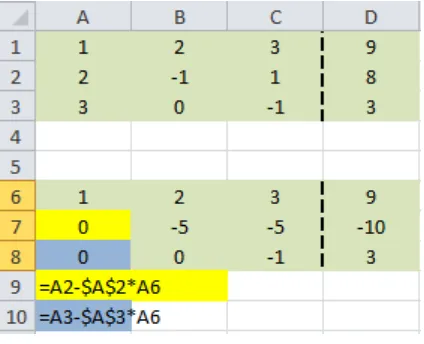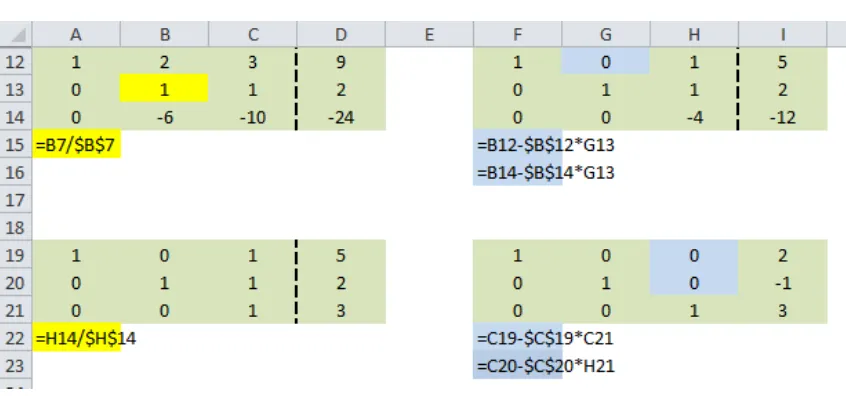Proceeding of International Conference On Research, Implementation And Education Of Mathematics And Sciences 2014, Yogyakarta State University, 18-20 May 2014
M-79
LEARNING GAUSS-JORDAN ELIMINATION USING MS EXCEL
Meifry Manuhutu
Ma Chung University, Malang – East Java
Abstract
In Linear Algebra, one of the most important method to learn is Gauss-Jordan Elimination. This method almost used in every basic concepts but it is difficult to learn. Fortunately, MS Windows provide one of its application, that is MS Excel, for students so that the method becomes easier to understand for science and technology students.This application has many functions and facilities that are related to matrices calculation such as MDETERMINANT, TRANSPOSE, and others. Nowadays students can easily study the method when using computer tecnology which almost everyday they use.In this way, they both can understand the method and do the calculation easily as long as they input the right function.
Key words: MS Excel Function, Gauss-Jordan Elimination
INTRODUCTION
Linear algebra has myriad of applicatons in computer and engineering sciences. The beginning of the study of linear algebra must be based on some firm foundations and, thus, with the treatment of matrices as mere arrays of numbers that arise naturally in the solution of systems of linear equations, a problem already familiar to the student. One of the subject of solving systems of linear equations is Gauss-Jordan Elimination. Students studying towards a college at sophomore level in a science and technology faculty are usually initiated into the subject using simple linear equations as a basis to investigate the familiar method of elimination of unknowns for the solution fo linear systems and thus obtain a useful method for solving such systens.
It is not trivial for students to apply those kinds of methods since this concept is abstract and how to conclude the solutions for the systems.
In advance of technology information era a student’s introduction to the topic of Gauss-Jordan elimination was restricted by paper-and-pencil-approach. This approach make the student hard to explore and the subject matter become error prone and tedious. Computer technology offers revolution in shape of the Internet, multimedia resources and educational software supported and enhanced the delivery of course materialsat all educational levels for technology is essential in teaching and learning mathematics; it influences the mathematics that is taught and enhanced students’ learning [4].
Meifry Manuhutu / Gauss-Jordan Using Excel ISBN.
M-80
mathematical problem solving powers inherent in spreadsheet.
Related to linear algebra learning the Excel spreadsheet has certain features or Excel function that make it for math-based tasks such as numerical evaluation or calculation which is easily used and user friendly. This qualification is important for currently more visually oriented students than previous generations were. Responding to this state of affairs the author of this paper has developed Excel based instructional tools for the Gauss-Jordan elimination learning.
This paper discusses how MS Excel spreadsheet application can help student to understand the concept easily and visually to solve linear equations using Gauss-Jordan elimination as one of basic concepts in linear algebra.
The Gauss-Jordan elimination procedure for solving the linear system
Ax
b
is as follows [1]:Step 1. Form the augmented matrix
A
b
.Step 2. Tranform the augmented matrix to reduced row echelon form by using elementary row operations.
Step 3. The linear system that corresponds to the matrix in reduced row echelon form that has been obtained in Step 2 has exactly the same solutions as the given linear system. For each nonzero row of the matrix in reduced row echelon form, solve the corresponding equation for the unknown that corresponds to the leading entry of the row. The rows consisting entirely of zeros can be ignored, since the corresponding equarion will be satisfied for any values of the unknowns.
To illustrate this procedure, we shall solve the linear system
In this section of paper we shall discuss and describe how Excel and its functions can be used illustrate what happens to linear equation system solution when it undergoes Gauss-Jordan procedure for equation (1) as described in section Introduction.
First, from step 1 of Gauss-Jordan procedur we shall arrange the coefficients of equation (1) in the spreadsheet as follows in Fig.1.
Before solving equation (1), we can investigate this equation has a solution by function MDETERM in Fig.2; and since its determinant is not zero, then it has a unique solution.
Proceeding of International Conference On Research, Implementation And Education Of Mathematics And Sciences 2014, Yogyakarta State University, 18-20 May 2014
M-81
Fig. 3 Elementary Row Operation
Since it is a 3x3 matrix, then we shall solve column by column from left to right by following Gauss-Jordan procedure. In step 2, we shall transform the augmented matrix to reduced row echelon form by using elementary row operations.
The first operation of elementary row operations is to make the first nonzero entry in each row that does not consist entirely zeros 1, called the leading entry of its row; or by interchanging rows. In the spreadsheet, the first row will be divided by cell A1, by using function ‘=A1/$A$1’ and we can copy the function to other cells in the first row. Fortunately, since the first entry of the matrix is 1, then we can skip this operation. This procedure can be done for the second and the third column as well at the second row and third row, respectively.
After producing the leading-1 in first column, now we shall make other entries int the column to become zeros entry. This will be done by substracting other row with respect to the first row. In this case, we shall substract two times row 1 to the row 2. In the spreadsheet, cell A2 will become cell A7 by function ‘=A2-$A$2*A6; then from cell A7 we can copy the formula by dragging the cell to cell B7 untill D7. The row operation for the third row is similar. In the spreadsheet, cell A3 will become cell A8 by function ‘=A3-$A$3*A6; then from cell A8 we can copy the formula by dragging the cell to cell B8 untill D8 as shown in Fig.3. This procedure will applied for the second column and the third column as well.
The result of spreadsheet calculation is shown in Fig.4 as follows; and the final result or solution for linear equation (1) is x=2, y= -1 and z=3.
Meifry Manuhutu / Gauss-Jordan Using Excel ISBN.
M-82
Fig. 4 Elementary Row Operation for second and third columns
If transpose of equation (1) can be executed by function TRANPOSE in the spreadsheet as follows. Since this is a 3x3 matrix, then firstly we capture 3x3 cells in the spreadsheet and add function ‘=TRANPOSE(array)’ and at the same time we press button “Ctrl” , “Shift’ and ‘Enter’. This is shown in Fig. 5. In the similar way, we can find its solution.
CONCLUSION AND SUGGESTION
From our discussion section, we can conclude that for elementary row operation, the operation used in the Excel spreadsheet is substraction, since Excel will automatically change the operation into addition if the contant entry is negative number. We can also find out first the solution of the linear equation by function MDETERMINANT. If its determinant is zero, then the spreadsheet will show that there will be a row whose entries are zeros.
For application in class, this material is taught after paper-and-pencil-approach, so they understand the concept of Gauss-Jordan elimination very well.
REFERENCES
[1] Kolman, Bernard., Intorductory Linear Algebra with Applications,International Edition, 6th Edition, Prencitce Hall , Inc., New Jersey, 1997.
[2] Howard Anton, and Chris Rorres, Aljabar Linear Elementer: Versi Aplikasi Jilid I, 8th Edition, Penerbit Erlangga, 2000.
[3] Howard Anton, and Chris Rorres, Aljabar Linear Elementer: Versi Aplikasi Jilid II, 8th Edition, Penerbit Erlangga, 2000.
[4] D. Allison, A. Didenko, and G. Miller, Investigating Transformation in the Cartesian Plane Using Spreadsheet, World Academy of Science, Engineering and Technology, Vol.7, 2013, pp. 668 – 671.


